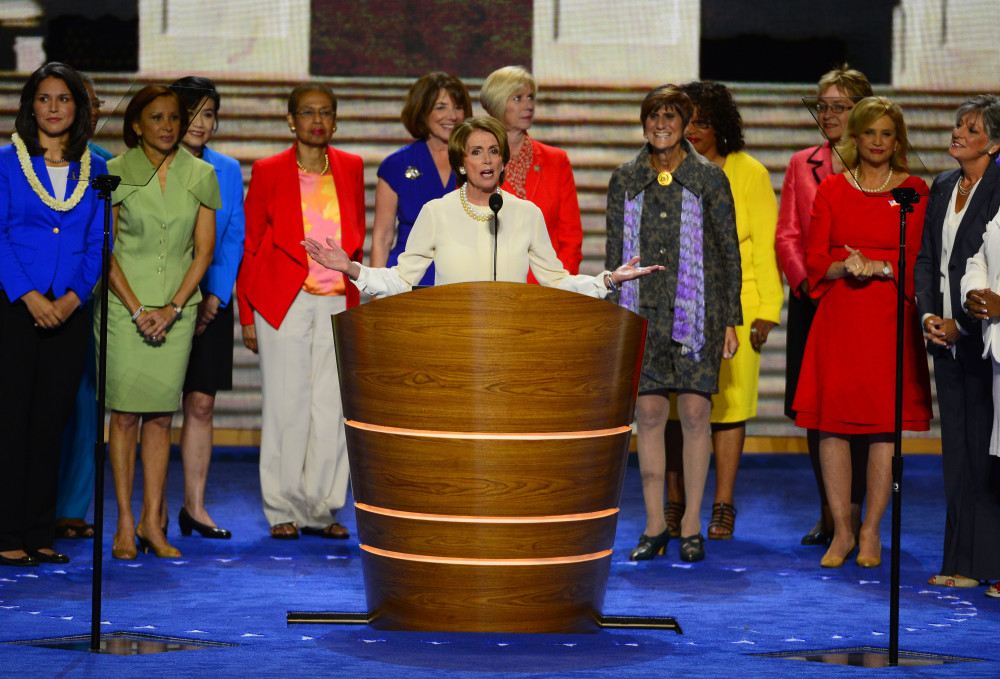By Carolyn Lochhead
San Francisco Chronicle.
WASHINGTON
To reporters asking why House Minority Leader Nancy Pelosi doesn’t step aside to make way for younger leaders after three consecutive disappointing elections, the 74-year-old Democrat hurled back a question of her own Thursday:
“What was the day that any of you said to Mitch McConnell, when they lost the Senate three times in a row, lost making progress in taking back the Senate three times in a row, ‘Aren’t you getting a little old, Mitch? Shouldn’t you step aside?'”
The reason it didn’t come up, the San Francisco Democrat said, was that McConnell is a man.
“It just is interesting as a woman to see how many times that question is asked of a woman and how many times that question is never asked of Mitch McConnell,” Pelosi said.
McConnell is the 72-year-old Kentucky Republican and Senate fixture who waited patiently through multiple GOP defeats, until the party started gaining seats in 2010. With this year’s election victories, the GOP will take over the chamber in January, and on Thursday, his fellow Republicans selected McConnell as majority leader.
Different trajectory
For Pelosi, the trajectory has been very different. She became the first female House speaker after Democrats seized the majority in 2006, but since 2010 the party has surrendered more than 65 seats and Pelosi lost her gavel.
Pelosi is the longest-serving party leader in the House since Sam Rayburn of Texas died in office in 1961. In decades past, party leaders have stepped down after big election defeats, including former Republican House Speaker Newt Gingrich, but that usually occurred after a rebellion in the ranks. Pelosi faces no opposition from her fellow Democrats.
When a female reporter asked the question on everyone’s mind at Pelosi’s first press conference since the Nov. 4 election, the minority leader seemed eager to put the issue to rest.
“My life and who I am is not dependent on being here,” Pelosi said. “So I have a liberty of, if you want me here, I’m happy to be here. If you don’t, I’m proud of what we have done together.”
Pelosi said she has “a mission for women on this score.”
“When we won the House, and that was largely an initiative that I started around 2000, to take us to a place where we would win the House, that was a big thing,” she said. “I was never on the cover of Time magazine, even though I was the first woman to be — wasn’t that a curiosity? That the Republicans win, (House Speaker John) Boehner’s on the front of Time magazine. Mitch McConnell wins, he’s on the front of Time magazine.
“Isn’t there a pattern here?” Pelosi asked. “As a woman, it’s like, is there a message here? Is there something that we’re missing?”
Another perspective
Dan Schnur, executive director of the Jesse M. Unruh Institute of Politics at the University of Southern California, said male politicians do get asked such questions, including Boehner when he had trouble controlling Tea Party sympathizers in the GOP caucus.
“These types of questions probably have less to do with gender and more with whether there’s a sense that some of the rank-and-file members might not be satisfied,” Schnur said. “If every reporter in Washington was hearing from every member of the Democratic House caucus that they were excited that Nancy Pelosi was going to stay on, she probably wouldn’t be getting asked these questions. But as John Boehner would tell you, when there is some discontent, the whispering starts and then the questions come.”
Barbara O’Connor, professor emeritus of communications at California State University Sacramento, said Pelosi’s response was legitimate. Her point, O’Connor said, was essentially that if members don’t want her to be minority leader anymore, they wouldn’t be electing her.
“She can be very testy on that topic, and certainly adjusting to being minority leader is a burden,” O’Connor said. “It’s certainly not a position she wants to be in, and then to have someone question her age and her willingness to serve would make her unhappy and angry.”
Pelosi’s trump card remains her fundraising prowess. She raised more than $101 million for her party in the last election and has pulled in $428.8 million since entering the House leadership in 2002.














































































































































































































































































































































































